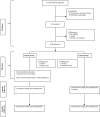Community-based rehabilitation training after stroke: results of a pilot randomised controlled trial (ReTrain) investigating acceptability and feasibility
- PMID: 29449290
- PMCID: PMC5829775
- DOI: 10.1136/bmjopen-2017-018409
Community-based rehabilitation training after stroke: results of a pilot randomised controlled trial (ReTrain) investigating acceptability and feasibility
Abstract
Objectives: To assess acceptability and feasibility of trial processes and the Rehabilitation Training (ReTrain) intervention including an assessment of intervention fidelity.
Design: A two-group, assessor-blinded, randomised controlled trial with parallel mixed methods process and economic evaluations.
Setting: Community settings across two sites in Devon.
Participants: Eligible participants were: 18 years old or over, with a diagnosis of stroke and with self-reported mobility issues, no contraindications to physical activity, discharged from National Health Service or any other formal rehabilitation programme at least 1 month before, willing to be randomised to either control or ReTrain and attend the training venue, possessing cognitive capacity and communication ability sufficient to participate. Participants were individually randomised (1:1) via a computer-generated randomisation sequence minimised for time since stroke and level of functional disability. Only outcome assessors independent of the research team were blinded to group allocation.
Interventions: ReTrain comprised (1) an introductory one-to-one session; (2) ten, twice-weekly group classes with up to two trainers and eight clients; (3) a closing one-to-one session, followed by three drop-in sessions over the subsequent 3 months. Participants received a bespoke home-based training programme. All participants received treatment as usual. The control group received an exercise after stroke advice booklet.
Outcome measures: Candidate primary outcomes included functional mobility and physical activity.
Results: Forty-five participants were randomised (ReTrain=23; Control=22); data were available from 40 participants at 6 months of follow-up (ReTrain=21; Control=19) and 41 at 9 months of follow-up (ReTrain=21; Control=20). We demonstrated ability to recruit and retain participants. Participants were not burdened by the requirements of the study. We were able to calculate sample estimates for candidate primary outcomes and test procedures for process and health economic evaluations.
Conclusions: All objectives were fulfilled and indicated that a definitive trial of ReTrain is feasible and acceptable.
Trial registration number: NCT02429180; Results.
Keywords: clinical trials; rehabilitation medicine; stroke medicine.
© Article author(s) (or their employer(s) unless otherwise stated in the text of the article) 2018. All rights reserved. No commercial use is permitted unless otherwise expressly granted.
Conflict of interest statement
Competing interests: Dean reports grants from The Stroke Association, during the conduct of the study; other from Wiley Blackwell, outside the submitted work; Forster, Poltawski, Spencer, Taylor, James, Allison, Stevens, Pulsford and Norris report grants from the Stroke Association; Calitri, Landa, Hollands, Shepherd were employed by the Stroke Association grant.
Figures
References
-
- Townsend N, Wickramasinghe K, Bhatnagar P, et al. Coronary heart disease statistics: 2012 edition. London: British Heart Foundation, 2012.
-
- Intercollegiate Stroke Working Party National clincial guideline for stroke. 5th edn London: Royal College of Physicians, 2016.
Publication types
MeSH terms
Associated data
LinkOut - more resources
Full Text Sources
Other Literature Sources
Medical


